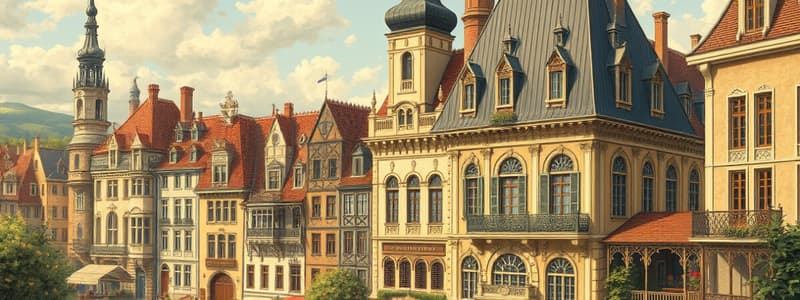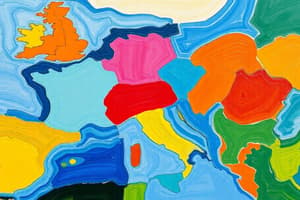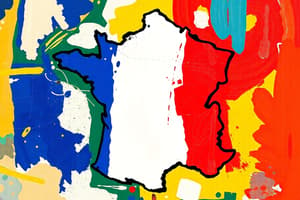Podcast
Questions and Answers
What was the primary reason for Gaul falling under Roman rule?
What was the primary reason for Gaul falling under Roman rule?
- Economic prosperity in Gaul
- Gaelic wars led by Julius Caesar (correct)
- Influence of the Celtic tribes
- Territorial disputes with surrounding nations
Which event marked the division of the Carolingian Empire into three kingdoms?
Which event marked the division of the Carolingian Empire into three kingdoms?
- Treaty of Verdun (correct)
- Formation of the Frankish Empire
- Reign of Philip II
- Battle of Hastings
What did the Gallo-Roman culture contribute to?
What did the Gallo-Roman culture contribute to?
- The establishment of the French military
- The foundation of the French language (correct)
- The rise of the English monarchy
- Reformation of the Catholic Church
Which monarch is recognized as the first King of France?
Which monarch is recognized as the first King of France?
In what year was the short-lived Gaelic Empire established?
In what year was the short-lived Gaelic Empire established?
What significant conflict arose from claims to the French throne?
What significant conflict arose from claims to the French throne?
Which empire became the heartland of the Carolingian Empire?
Which empire became the heartland of the Carolingian Empire?
Who led the Gaelic wars against the Romans?
Who led the Gaelic wars against the Romans?
What event is associated with the rise of French nationalism in 1453?
What event is associated with the rise of French nationalism in 1453?
Which treaty was signed by Henry II of France to conclude the conflict with England?
Which treaty was signed by Henry II of France to conclude the conflict with England?
What significant event followed the financial troubles in France in 1789?
What significant event followed the financial troubles in France in 1789?
Which French ruler began the Napoleonic Wars?
Which French ruler began the Napoleonic Wars?
What was a result of the Paris Peace Conference held in 1919?
What was a result of the Paris Peace Conference held in 1919?
What did the Edict of Nantes provide to the Huguenots in France?
What did the Edict of Nantes provide to the Huguenots in France?
Which empire emerged after the collapse of the second French Empire in 1870?
Which empire emerged after the collapse of the second French Empire in 1870?
What was the primary effect of the Seven Years War on France?
What was the primary effect of the Seven Years War on France?
Who was crowned Emperor of the First French Empire in 1804?
Who was crowned Emperor of the First French Empire in 1804?
What marked the end of Napoleon's rule in France?
What marked the end of Napoleon's rule in France?
What event triggered the declaration of war against Germany by France and Britain in 1939?
What event triggered the declaration of war against Germany by France and Britain in 1939?
Which leader established Free France as a government in exile in London?
Which leader established Free France as a government in exile in London?
What was the main outcome of the Battle of Dien Bien Phu for France?
What was the main outcome of the Battle of Dien Bien Phu for France?
What was established in August 1944 to continue the war against Germany?
What was established in August 1944 to continue the war against Germany?
What system was established in France after the Fourth Republic was dissolved?
What system was established in France after the Fourth Republic was dissolved?
Which of the following was a consequence of the end of the Fourth Republic?
Which of the following was a consequence of the end of the Fourth Republic?
What does France's status as a permanent member of the United Nations Security Council signify?
What does France's status as a permanent member of the United Nations Security Council signify?
Which economic zone is France a founding member of?
Which economic zone is France a founding member of?
France is officially known as the French ______.
France is officially known as the French ______.
Gaul fell under Roman rule during the ______ and first centuries BC.
Gaul fell under Roman rule during the ______ and first centuries BC.
The Treaty of Verdun, signed in 843, divided the Carolingian Empire into three ______.
The Treaty of Verdun, signed in 843, divided the Carolingian Empire into three ______.
The founding of the kingdom of France occurred in ______.
The founding of the kingdom of France occurred in ______.
The House of ______ succeeded to the French throne in 1328.
The House of ______ succeeded to the French throne in 1328.
A short-lived Gaelic Empire was established by Roman commander ______.
A short-lived Gaelic Empire was established by Roman commander ______.
The Frankish Empire became the heartland of the ______ Empire.
The Frankish Empire became the heartland of the ______ Empire.
During the ______ era, the Celtic tribes known as the Gauls settled in Gaul.
During the ______ era, the Celtic tribes known as the Gauls settled in Gaul.
In 1939, Germany's invasion of Poland caused France and Britain to declare war against ______, triggering the Second World War.
In 1939, Germany's invasion of Poland caused France and Britain to declare war against ______, triggering the Second World War.
In 1940, France was invaded by Nazi ______, and Paris soon fell to the Germans.
In 1940, France was invaded by Nazi ______, and Paris soon fell to the Germans.
Under the lead of French General Charles de ______, Free France was set up as a government in exile in London.
Under the lead of French General Charles de ______, Free France was set up as a government in exile in London.
A German puppet state known as ______ was established to govern the unoccupied part of France.
A German puppet state known as ______ was established to govern the unoccupied part of France.
In 1944, the Allied invaded ______, paving the way for the liberation of Paris.
In 1944, the Allied invaded ______, paving the way for the liberation of Paris.
On October 13, 1946, the gprf was replaced by the ______ Republic, opening an era of great economic growth in France.
On October 13, 1946, the gprf was replaced by the ______ Republic, opening an era of great economic growth in France.
The French Fifth Republic was established with Charles de ______ as the first president.
The French Fifth Republic was established with Charles de ______ as the first president.
In 2017, ______ was elected President of the French Republic, and was re-elected in the 2022 presidential election.
In 2017, ______ was elected President of the French Republic, and was re-elected in the 2022 presidential election.
The war ended in 1453 with the velius victory, strengthening French ______ and increasing the power and reach of the French monarchy.
The war ended in 1453 with the velius victory, strengthening French ______ and increasing the power and reach of the French monarchy.
The French Renaissance in the 16th century witnessed the first standardization of the French ______.
The French Renaissance in the 16th century witnessed the first standardization of the French ______.
In 1789, financial troubles led to the convocation of the ______ general, signaling the outbreak of the French Revolution.
In 1789, financial troubles led to the convocation of the ______ general, signaling the outbreak of the French Revolution.
Following the 30 Years War, France reached its peak under the rule of ______ the 14th.
Following the 30 Years War, France reached its peak under the rule of ______ the 14th.
The first French Empire was declared in ______.
The first French Empire was declared in ______.
Napoleon crowned himself emperor and began his massive expansion of France and Europe via the ______ Wars.
Napoleon crowned himself emperor and began his massive expansion of France and Europe via the ______ Wars.
Napoleon's defeat in the Battle of ______ in 1815 marked the end of the first French Empire.
Napoleon's defeat in the Battle of ______ in 1815 marked the end of the first French Empire.
The Second Republic was established with ______ Napoleon Bonaparte as the president.
The Second Republic was established with ______ Napoleon Bonaparte as the president.
By the 20th century, the French colonial empire became the world's second largest ______ empire.
By the 20th century, the French colonial empire became the world's second largest ______ empire.
The main result of the Paris Peace Conference in 1919 was the Treaty of ______.
The main result of the Paris Peace Conference in 1919 was the Treaty of ______.
Flashcards are hidden until you start studying
Study Notes
Geography and Global Influence
- France, officially the French Republic, spans 643,801 square kilometers across Western Europe and overseas regions.
- Modern-day France is recognized as a major global power in economy, culture, military, and politics.
Historical Overview
- The region known as Gaul was inhabited by Celtic tribes called Gauls since the Paleolithic era.
- Roman conquest of Gaul occurred during the Gaelic wars led by Julius Caesar in the second and first centuries BC, dividing Gaul into five regions.
- Integration into the Roman Empire led to the development of Gallo-Roman culture, forming the basis for the French language.
Formation of Early France
- In 843, the Treaty of Verdun divided the Carolingian Empire into West Francia, Middle Francia, and East Francia.
- West Francia evolved into the Kingdom of France in 987 under the rule of the House of Capet.
- Philip II Augustus became the first monarch to officially style himself as King of France, establishing France as a powerful state by the end of his reign.
Wars and Territorial Expansion
- The Hundred Years' War (1337-1453) between England and France arose from succession disputes and ended with French victory, fostering nationalism.
- The French Renaissance in the 16th century led to language standardization and territorial conflicts with the House of Habsburg.
- Religious strife manifested in the French Wars of Religion, concluding with the Edict of Nantes, which granted tolerance to Huguenots.
Revolutionary Changes
- The financial crisis of 1789 instigated the French Revolution, abolishing the monarchy and establishing the Declaration of the Rights of Man and of the Citizen.
- The First French Republic was formed, followed by a coup d'état that brought Napoleon Bonaparte to power, declaring the First French Empire in 1804.
Napoleon and the Napoleonic Wars
- Napoleon expanded France's influence throughout Europe, forging alliances until his defeat at the Battle of Waterloo in 1815.
- Post-Napoleon, France experienced political instability but maintained economic strength.
Republics and Colonial Empire
- The Second Republic was established in 1848, leading to the Second French Empire under Napoleon III.
- Following defeat in the Franco-Prussian War (1870), the Third Republic arose, expanding French colonial territories significantly.
World Wars and Aftermath
- France participated in World War I (1914-1918) as part of the Allied powers, resulting in significant casualties but eventual victory.
- The Paris Peace Conference and the Treaty of Versailles restored French territories lost in previous conflicts and penalized Germany.
- In World War II, France was invaded by Nazi Germany in 1940, leading to the establishment of Vichy France and a government in exile led by Charles de Gaulle.
Post-War Recovery and Independence
- After liberation in 1944, the Provisional Government of the French Republic was formed, followed by the establishment of the Fourth Republic in 1946.
- France faced challenges during decolonization, resulting in independence for Algeria and several colonies.
- The Fifth Republic was founded with Charles de Gaulle as President, marking a new era for France.
Contemporary France
- France is now a developed nation with the world's seventh-largest economy by nominal GDP.
- It remains a key player in global affairs, holding a permanent seat on the United Nations Security Council and recognized as a nuclear power.
- France is a founding member of the European Union and participates in important international groups such as NATO and the G7.
Geography and Global Influence
- France, officially the French Republic, spans 643,801 square kilometers across Western Europe and overseas regions.
- Modern-day France is recognized as a major global power in economy, culture, military, and politics.
Historical Overview
- The region known as Gaul was inhabited by Celtic tribes called Gauls since the Paleolithic era.
- Roman conquest of Gaul occurred during the Gaelic wars led by Julius Caesar in the second and first centuries BC, dividing Gaul into five regions.
- Integration into the Roman Empire led to the development of Gallo-Roman culture, forming the basis for the French language.
Formation of Early France
- In 843, the Treaty of Verdun divided the Carolingian Empire into West Francia, Middle Francia, and East Francia.
- West Francia evolved into the Kingdom of France in 987 under the rule of the House of Capet.
- Philip II Augustus became the first monarch to officially style himself as King of France, establishing France as a powerful state by the end of his reign.
Wars and Territorial Expansion
- The Hundred Years' War (1337-1453) between England and France arose from succession disputes and ended with French victory, fostering nationalism.
- The French Renaissance in the 16th century led to language standardization and territorial conflicts with the House of Habsburg.
- Religious strife manifested in the French Wars of Religion, concluding with the Edict of Nantes, which granted tolerance to Huguenots.
Revolutionary Changes
- The financial crisis of 1789 instigated the French Revolution, abolishing the monarchy and establishing the Declaration of the Rights of Man and of the Citizen.
- The First French Republic was formed, followed by a coup d'état that brought Napoleon Bonaparte to power, declaring the First French Empire in 1804.
Napoleon and the Napoleonic Wars
- Napoleon expanded France's influence throughout Europe, forging alliances until his defeat at the Battle of Waterloo in 1815.
- Post-Napoleon, France experienced political instability but maintained economic strength.
Republics and Colonial Empire
- The Second Republic was established in 1848, leading to the Second French Empire under Napoleon III.
- Following defeat in the Franco-Prussian War (1870), the Third Republic arose, expanding French colonial territories significantly.
World Wars and Aftermath
- France participated in World War I (1914-1918) as part of the Allied powers, resulting in significant casualties but eventual victory.
- The Paris Peace Conference and the Treaty of Versailles restored French territories lost in previous conflicts and penalized Germany.
- In World War II, France was invaded by Nazi Germany in 1940, leading to the establishment of Vichy France and a government in exile led by Charles de Gaulle.
Post-War Recovery and Independence
- After liberation in 1944, the Provisional Government of the French Republic was formed, followed by the establishment of the Fourth Republic in 1946.
- France faced challenges during decolonization, resulting in independence for Algeria and several colonies.
- The Fifth Republic was founded with Charles de Gaulle as President, marking a new era for France.
Contemporary France
- France is now a developed nation with the world's seventh-largest economy by nominal GDP.
- It remains a key player in global affairs, holding a permanent seat on the United Nations Security Council and recognized as a nuclear power.
- France is a founding member of the European Union and participates in important international groups such as NATO and the G7.
Studying That Suits You
Use AI to generate personalized quizzes and flashcards to suit your learning preferences.




